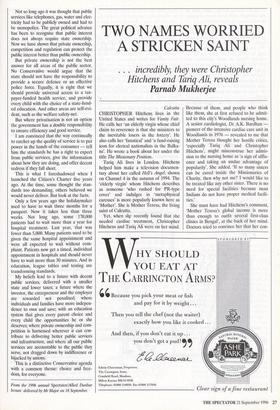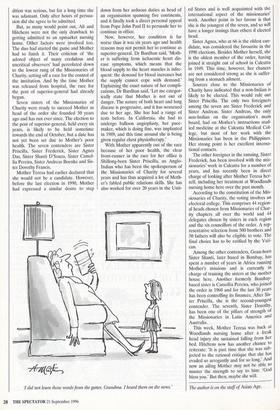TWO NAMES WORRIED A STRICKEN SAINT
. . . incredibly, they were Christopher .
Hitchens and Tariq Ali, reveals Parnab Mukherjee
Calcutta CHRISTOPHER Hitchens lives in the United States and writes for Vanity Fair. He calls her an elderly virgin whose chief claim to reverence is that she ministers to the inevitable losers in the lottery'. He also calls her 'fanatical' and 'a fund-raising icon for clerical nationalists in the Balka- ns'. He wrote a book about her under the title The Missionary Position.
Tariq Ali lives in London. Hitchens helped him make a television documen- tary about her called Hell's Angel, shown on Channel 4 in the autumn of 1994. The 'elderly virgin' whom Hitchens describes as someone 'who rushed for PR-type cover' and indulges in 'metaphysical caresses' is more popularly known here as 'Mother'. She is Mother Teresa, the living saint of Calcutta.
Yet, when she recently found that she needed cardiac treatment, Christopher Hitchens and Tariq Ali were on her mind.
Because of them, and people who think like them, she at first refused to be admit- ted to this city's Woodlands nursing home, A senior cardiologist, Dr A.K. Bardhan pioneer of the intensive cardiac care unit in Woodlands in 1976 — revealed to me that Mother Teresa thought her hostile critics, 'especially Tariq All and Christopher Hitchens', might misconstrue her admis- sion to the nursing home as 'a sign of afflu- ence and taking an undue advantage of popularity'. She added, 'If so many sisters can be cured inside the Missionaries of Charity, then why not me? I would like to be treated like any other sister. There is no need for special facilities because most Indians do not have proper medical facili- ties.'
She must have had Hitchens's comment, 'Mother Teresa's global income is more than enough to outfit several first-cla,ss clinics in Bengal', at the back of her mind. Doctors tried to convince her that her con- dition was serious, but for a long time she was adamant. Only after hours of persua- sion did she agree to be admitted.
But, as many would point out, All and Hitchens were not the only drawback to getting admitted to an upmarket nursing home. Other factors were involved too. The duo had started the game and Mother had to finish it. Their criticism of 'the adored object of many credulous and uncritical observers' had percolated down to the lowest rung of the Missionaries of Charity, setting off a race for the control of the institution. And by the time Mother was released from hospital, the race for the post of superior-general had already begun.
Seven sisters of the Missionaries of Charity were ready to succeed Mother as head of the order she founded 50 years ago and has run ever since. The election to the post of superior-general, held every six years, is likely to be held sometime towards the end of October, but a date has not yet been set due to Mother's poor health. The seven contenders are Sister Priscilla, Sister Frederick, Sister Agnes Das, Sister Shanti D'Souza, Sister Camel- Ha Pereira, Sister Andreas Boenke and Sis- ter Dorothy Francis.
Mother Teresa had earlier declared that she would not be a candidate. However, before the last election in 1990, Mother had expressed a similar desire to step down from her arduous duties as head of an organisation spanning five continents, and it finally took a direct personal appeal from Pope John Paul II to persuade her to continue in office.
Now, however, her condition is far worse than it was six years ago and health reasons may not permit her to continue as superior-general. Dr Bardhan said, 'Moth- er is suffering from ischaemic heart dis- ease symptoms, which means that the blood supply to the heart muscles is infre- quent: the demand for blood increases but the supply cannot cope with demand.' Explaining the exact nature of her compli- cations, Dr Bardhan said, 'Let me categor- ically state that Mother is not out of danger. The nature of both heart and lung disease is progressive, and it has worsened due to her age. She has had a range of tests before. In California, she had to undergo balloon angioplasty, her pace- maker, which is doing fine, was implanted in 1989, and this time around she is being given regular chest physiotherapy.'
With Mother apparently out of the race because of her poor health, the clear front-runner in the race for her office is Shillong-born Sister Priscilla, an Anglo- Indian who has been the spokesperson of the Missionaries of Charity for several years and has thus acquired a lot of Moth- er's fabled public relations skills. She has also worked for over 20 years in the Unit-
' did not learn those words from the gutter, Grandma. I heard them on the news.' ed States and is well acquainted with the international aspect of the missionaries' work. Another point in her favour is that she is the youngest of the seven, and so will have a longer innings than others if elected head.
Sister Agnes, who at 66 is the oldest can- didate, was considered the favourite in the 1990 elections. Besides Mother herself, she is the oldest member of the order, having joined it straight out of school in Calcutta in 1949. This time, however, her chances are not considered strong as she is suffer- ing from a stomach ailment.
Sources close to the Missionaries of Charity have indicated that a non-Indian is likely to be elected. This would rule out Sister Priscilla. The only two foreigners among the seven are Sister Frederick and Sister Andreas. Sister Andreas, the only non-Indian on the organisation's main board, had on Mother's instructions stud- ied medicine at the Calcutta Medical Col- lege, but most of her work with the Missionaries has been in the Philippines. Her strong point is her excellent interna- tional contacts.
The other foreigner in the running, Sister Frederick, has been involved with the mis- sionaries' work in Calcutta for a number of years, and has recently been in direct charge of looking after Mother Teresa her- self, including her treatment at Woodlands nursing home here over the past month.
According to the constitution of the Mis- sionaries of Charity, the voting involves an electoral college. This comprises 44 region- al heads chosen from Missionaries of Char- ity chapters all over the world and 44 delegates chosen by sisters in each region and the six councillors of the order. A rep- resentative selection from 500 brothers and 50 fathers will also be eligible to vote. The final choice has to be ratified by the Vati- can.
Among the other contenders, Goan-born Sister Shanti, later based in Bombay, has spent a number of years in Africa running Mother's missions and is currently in charge of training the sisters at the mother house here. Another formerly Bombay- based sister is Camellia Pereira, who joined the order in 1960 and for the last 30 years has been controlling its finances. After Sis- ter Priscilla, she is the second-youngest contender. The seventh, Sister Dorothy, has been one of the pillars of strength of the Missionaries in Latin America and Australia.
This week, Mother Teresa was back at Woodlands nursing home after a freak head injury she sustained falling from her bed. Hitchens now has another chance to reiterate: 'It is past time that she was sub- jected to the rational critique that she has evaded so arrogantly and for so long.' And now an ailing Mother may not be able to muster the strength to say to him: `God bless you.' But then, maybe she will.
The author is on the staff of Asian Age.



















































































 Previous page
Previous page